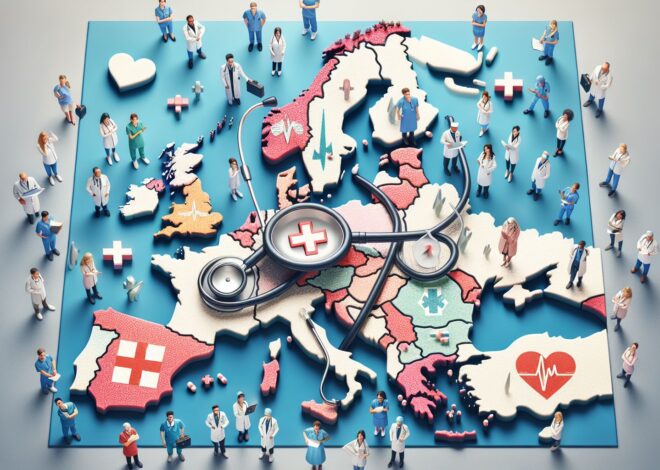
The Preparedness and Response of European Health Systems: A Critical Analysis
Introduction:
The ongoing COVID-19 pandemic has brought to light the importance of the preparedness and response of healthcare systems worldwide. In this article, we will focus on European health systems and analyze their ability to handle public health emergencies. Addressing health professionals, policymakers, and concerned citizens alike, we will provide a factual and insightful examination of their strengths, weaknesses, and areas for improvement.
Body:
The Strengths of European Health Systems:
European health systems have several notable strengths that contribute to their overall preparedness and response in times of crisis. First and foremost, many European countries have a well-established universal healthcare system, ensuring essential healthcare services are available to all citizens. This accessibility to healthcare is a significant advantage in the face of a pandemic, as it helps to identify and contain cases promptly.
Second, European health systems are characterized by a highly skilled and educated healthcare workforce. The continent boasts numerous prestigious medical schools and research institutions, ensuring a constant influx of competent health professionals. The expertise of these healthcare workers plays a crucial role in effectively managing public health emergencies.
Third, European health systems often possess robust surveillance and monitoring mechanisms. These systems enable early detection of outbreaks and provide real-time data for analysis and response. Additionally, efficient communication networks between healthcare facilities and public health authorities help in disseminating vital information swiftly, raising awareness, and implementing appropriate measures.
Finally, European health systems prioritize evidence-based medicine and scientific research. This commitment to rigorous research and continuous development equips them with the necessary knowledge and tools to respond effectively to public health crises. By leveraging the collective expertise of medical researchers and public health professionals, European health systems can adapt policies and guidelines rapidly, based on the latest available scientific evidence.
Weaknesses and Areas for Improvement:
While European health systems demonstrate several strengths, there are also certain weaknesses that must be addressed to enhance their preparedness and response capabilities. One significant challenge is the lack of integration and coordination between healthcare systems across different European countries. This fragmentation hampers the ability to mount a unified response during cross-border health crises, limiting the effectiveness of individual countries’ efforts.
Another area of concern is the underinvestment in public health infrastructure and resources. A significant proportion of healthcare budgets often goes towards curative care, with lesser emphasis on preventive measures and preparedness. Limited resources for essential public health services, such as early detection, contact tracing, and robust laboratory capabilities, can severely compromise the response to emerging infectious diseases.
Additionally, the COVID-19 pandemic has exposed flaws in the supply chain management of healthcare systems across Europe. Insufficient stockpiles of personal protective equipment (PPE) and essential medical supplies led to critical shortages during the initial stages of the pandemic. Robust inventory management and contingency plans for emergencies need to be established to prevent such shortages in the future.
Recommendations for Strengthening European Health Systems:
To ensure European health systems are adequately prepared for future public health emergencies, several recommendations must be considered:
-
Enhancing cross-border collaboration: European countries should strengthen their coordination efforts, promote information sharing, and establish unified strategies to tackle cross-border health challenges. This could involve establishing joint early warning systems and mutual aid agreements.
-
Increasing investment in public health: Governments must prioritize strengthening public health infrastructure, including surveillance systems, laboratory capabilities, and workforce capacity. Adequate funding will enable the development and implementation of comprehensive preventive measures.
-
Improving supply chain management: European health systems should establish robust supply chain networks, including creating strategic stockpiles of essential medical supplies and PPE. Regular audits and contingency plans should be in place to tackle unexpected surges in demand.
-
Promoting research and innovation: Continual investment in medical research and development is vital to strengthen the evidence base and empower European health systems to respond effectively to emerging health risks. Collaboration between academia, industry, and healthcare providers should be encouraged to drive innovation forward.
Conclusion:
European health systems possess numerous strengths that contribute to their preparedness and response capabilities during public health emergencies. However, addressing weaknesses such as fragmented coordination, underinvestment in public health, and supply chain vulnerabilities is crucial for improving their resilience. By adopting the recommendations outlined above, European countries can bolster their health systems and navigate future public health challenges with greater efficiency and effectiveness. The COVID-19 pandemic serves as a stark reminder of the importance of continuous preparedness and response in healthcare systems worldwide, and Europe must seize this opportunity to strengthen its healthcare infrastructure for a safer future.



